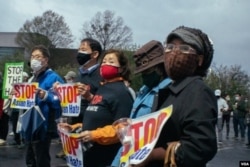On a rainy Thursday, the neon “OPEN” sign was dark at Tan Xiaojie’s spa, where her life ended one day before her 50th birthday.
Tan’s business, Young’s Asian Massage, is on the busy Highway 92, about a 40-minute drive north from Atlanta. Nine days earlier, on March 16, a bullet ended Tan’s life while she was at work.
The suspect, 21-year-old Robert Aaron Long, then drove to another two spas, the Gold Spa and the Aromatherapy Spa, killing eight people, six of whom were Asian women.
A growing memorial filled with candles and flowers marks the entrance to Tan’s business. Countless posters hang on the window. “Stop Asian Hate,” “Every Victim is a loved one lost,” “Black + Asian Solidarity,” are three of the visible slogans.
Next to Tan’s spa is Gabby’s Boutique, a store specializing in Mexican-style clothes. Dozens of cowboy boots were on display along with short Vaquero jackets. Storeowner Rita Barron said that Tan was a very hardworking woman, often staying for a 12-hour shift in her store. For the past few years, the two business owners had exchanged Christmas gifts.
Alex Acosta, Barron’s husband, who also works in the clothing store, said that at the time of the incident, he heard four shots from the next door. Later, he watched police carrying several people out of Tan’s massage parlor. One had been shot between the eyes.
“It’s crazy. I don’t know what happened to his brain,” Acosta said of the gunman. As for Tan and her husband, “they seem like very nice people.”
'No More Silence'
That night, I drove to Duluth, a town northeast of Atlanta, to attend a vigil for the six Asian victims organized by the Atlanta Korean American Committee Against Asian Hate Crimes. People gathered in a shopping mall parking lot, by a Beauty Master sign. Among the six Asian victims, four were Korean Americans, and two were of Chinese descent, including Tan: Daoyou Feng, 44, Soon C. Park, 74, Hyun J. Grant, 51, Suncha Kim, 69, and Yong A. Yue, 69.
Georgia’s location in the American deep South meant it was not traditionally a place where Chinese and Asian immigrants would resettle, but local residents said the Asian community in the Atlanta metropolitan area has expanded rapidly in the past 30 years. Most Asian immigrants live in the areas north of Atlanta, particularly in suburbs including Duluth, Johns Creek, and Alpharetta.
The vigil started before I arrived, and there were a few hundred people on the scene. Most of them held signs reading, “Stop Asian Hate.” A black table, its top outlined with candles, stood in the crowd’s center.
Among the participants was Su Jing, a mother of four. The organizers had invited her to speak on behalf of the Chinese American communities.
“We come here for different reasons, but we also love this country and fight for the peace and equality the country believes in,” she said.
"No more silence!” she chanted.
“No more silence!” the participants echoed.
I approached Su after her speech. She said she’s been a stay-at-home mom for nearly 10 years, but the spate of Asian hate crimes made her feel she had to do something.
“As a mother, I think I am more empathetic towards the victims who have lost their families,” she said with tears in her eyes. “If our generation doesn’t stand up, then we are just leaving the problem to our kids.”
Memorial
A funeral Mass was celebrated last Friday for Tan at the Catholic Church of St. Ann in Marietta, northwest of Atlanta. The private service was not open to the public but was streamed online. I chose to stand outside the church, witnessing the arrival of a few dozen of Tan’s friends and relatives, all dressed in black, nearly all of them Asian.
During the eulogy, Tan’s ex-husband Michael Webb told mourners that Tan and her daughter, Jami Webb, moved from China’s southern city of Nanning to Georgia with him in 2008. Tan started as a nail technician, worked hard and became the owner of two massage parlors.
Webb said that Tan’s family in China now wants Jami, a naturalized U.S. citizen, to return to China “because they think it’s just not safe here anymore.”
“And who could blame them?” Webb asked, “This is the kind of example our country is setting for the rest of the world.”
Nearly every Chinese person I spoke with in Atlanta - rally attendees, shop owners, Chinese students and scholars - said the tragedy should be a wake-up call to the Asian communities. For a very long time, they believed that working hard and keeping their heads down was all they needed to thrive in America.
The man charged in the Atlanta shootings has claimed that his motive wasn’t racial. He told police he had a sex addition, and wanted temptation removed.
As authorities continue to investigate the motive, fury is building in Georgia’s Asian American and Pacific Islander (AAPI) community because the majority of the victims were Asian women. Some have been outraged that police have not yet designated the shootings as a hate crime.
The owner of another shop near Tan’s Spa said that since the shooting, a steady stream of people has been showing up to memorialize Tan. The owner requested anonymity.
The pile of flowers and display of posters continue to grow at Tan’s shop. The card with hours of service hangs in the middle of the shop door. “Open 7 Days A Week, 8:00 am to 10:00 pm. Call or Text.”









